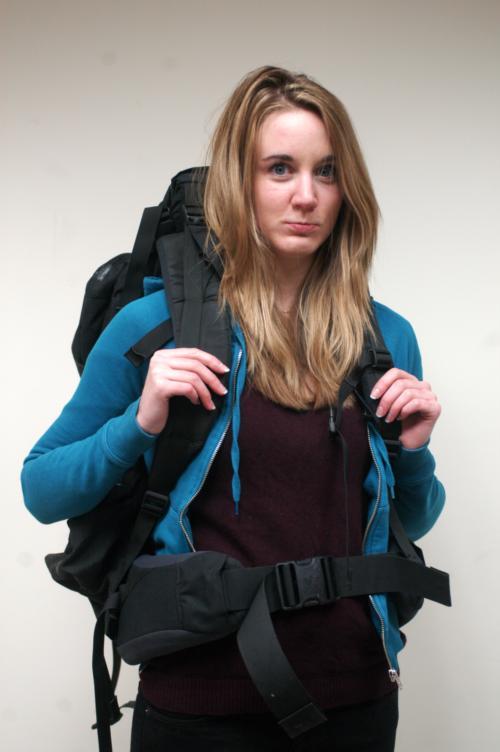
Failure to Thrive
I decided as a hopeful pre-frosh that college would be all about assimilation, even if it killed me. After years of being held back by a family a tad too eccentric for my hometown’s comfort, I was ready to joyfully jump into the mainstream. With my creepy ability to gauge the general atmosphere of a place and then adopt it as my own, I decided even before my freshman year that Harvard was brimming with scrappy people who like to go hiking and recycle plastics and give and receive head lamps as gifts. Yet one rather large obstacle to acceptance remained. While my peers lovingly stroked the “North Face” logo on their ubiquitous fleeces at the mere mention of the word “camping,” I suffered from intense flashbacks of living in a teepee in the middle of the New Mexican desert with my bizarre family every summer of my childhood. But that particular sordid fact from my past, as well as pretty much everything else about me, I firmly intended to shove into the background so that my new persona as a normal, Gore-Tex-loving co-ed could take center stage. All it was going to take, I decided, was a little imagination and a lot of grit.
When the packet of orientation activities arrived in the mail, I took a few deep breaths and picked FOP, a week of camping for all of the nature-loving undergrads I was soon to join. I lied shamelessly on the forms, ellipsing my experience living on the land in New Mexico without running water, toilets, or joy, and signed up for a beginner trip. My father was surprised at my orientation activity choice (“But Lizzie, you hate camping. And nature.” “You don’t even know me!”). But I was convinced that a week of camping was only my first step on the lengthy road to normalcy, and I honestly thought I was more than ready to take it.
As if the almighty FOP gods saw through my feeble attempts at dissembling, I was placed on an advanced trip in what my group leader called a “big mistake” when I approached him to complain. I had no backpack, no head lamp—I didn’t even have a North Face fleece. My new groupmates looked at me, distant but curious. There was the ripped marathon runner, the guy who described his backyard as a “wilderness” he tamed for fun, and the girl who had spent her summer on some sort of death march-esque wilderness experience in Alaska. Then there was me, wearing a pink bandana. As I strapped on my rented backpack on the first day, I tried to push away memories of wandering around the land in New Mexico, searching for any point in the landscape that differentiated itself from the rest, and to focus on the scenery in front of me.
Somewhere between the frantic name games and M&M-spiked trail mix, I began to think that I might survive the trip with minimal traumatic flashbacks. After the desolate expanses of Texas and New Mexico, New Hampshire seemed cute to me (a word I was never to use again after watching the horror cross my fellow hikers’ faces). The fact that the group leaders would elaborately “bear-trap” our supplies every night when we were only a few miles from the highway was endearing rather than intimidating. The earnestness of New England camping marked a large enough contrast to my earlier, too-real outdoors experience in the isolated mountain desert that I began to let go of bad memories. I began to hope anew: maybe if wilderness meant New Hampshire, I could be Nature Girl.
Then it began to rain. At first a novelty, the downpour did not cease for the next two days and nights. We slept on wet tarps, our bear bags were soaked, and I had no article of dry clothing in all of my soggy backpack. I transformed from too-talkative and overeager to silently focused on survival. At the end of the third day, our leader announced that we would evacuate the area because of the danger of flooding.
“Thank God! We are being evacuated! We are saved!” I yelled, possibly the first words to escape my mouth in several hours. The thought of helicopters, sirens, and the warmth of a hospital bed surged over me in the form of sweet relief.
The group turned and looked at me.
“We’re not being evacuated. We’re evacuating ourselves,” the leader explained.
Evacuating oneself, as it turns out, sucks. The hike out is a wet blur in my memory, except for when we had to ford a flooded river using ropes in a sort of life-or-death trust fall. In testimonials printed on FOP’s promotional materials, this should have been the moment when I rose to the challenge, mastered my fear, and remained changed forever. In real life, I shouted a few profanities as my grip on the rope slipped and the team leader was forced to lug me across the river with one arm.
I worry that you, dear reader, might be anxious at this juncture in my narrative. Did I ever find my inner nature lover, and/or manage to assimilate successfully into the Harvard community? Well, no...but hey, assimilation—and fleece—are overrated.
—Liz C. Goodwin ’08 is a History and Literature concentrator in Eliot House. Her ideal date is a picnic in the woods.


